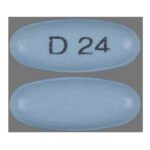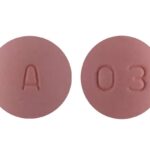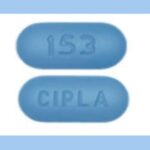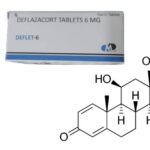83 Pills: Uses, Dosage, Side Effects, Interactions
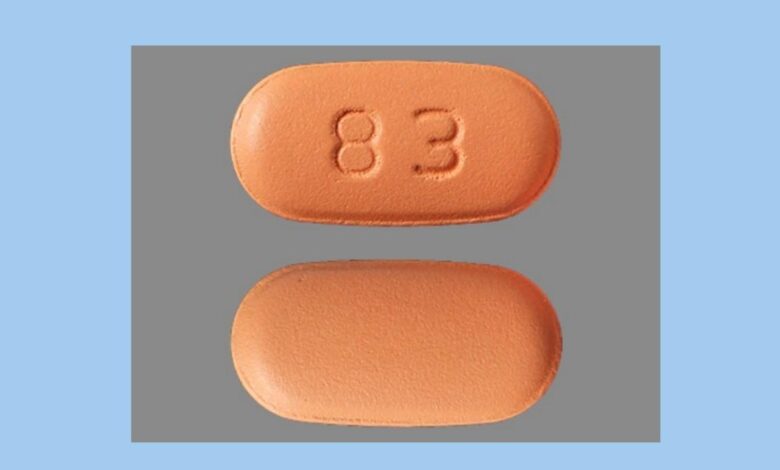
The red, capsule-shaped pill with the imprint 83 has been identified as Levofloxacin 500 mg. It is supplied by Torrent Pharmaceuticals Limited. 83 pills are used to treat certain infections such as pneumonia, and kidney, prostate (a male reproductive gland), and skin infections. 83 pill is also used to prevent anthrax (a serious infection that may be spread on purpose as part of a bioterror attack) in people who may have been exposed to anthrax germs in the air, and treat and prevent plague (a serious infection that may be spread on purpose as part of a bioterror attack.
In addition, 83 pills may also be used to treat bronchitis, sinus infections, or urinary tract infections but should not be used for bronchitis and certain types of urinary tract infections if there are other treatment options available. Levofloxacin is in a class of antibiotics called fluoroquinolones. It works by killing bacteria that cause infections. Antibiotics such as 83 pills will not work for colds, flu, or other viral infections. Using antibiotics when they are not needed increases your risk of getting an infection later that resists antibiotic treatment.
How to use 83 pills
Read the 83 pills Medication Guide provided by your pharmacist before you start taking 83 pills and each time you get a refill. If you have any questions, ask your doctor or pharmacist.
Take this medication by mouth as directed by your doctor, usually once daily with or without food. Drink plenty of fluids while taking this medication unless otherwise directed by your doctor.
Take 83 pills at least 2 hours before or 2 hours after taking other products that may make it work less well. Examples include quinapril, sucralfate, vitamins/minerals (including iron, zinc), and products that contain magnesium, aluminum, or calcium (such as antacids, didanosine solution, calcium-enriched juice), among others. Ask your pharmacist about all the products you take.
The dosage and length of treatment are based on your medical condition and response to treatment. In children, the dosage is also based on weight.
For the best effect, take this antibiotic at evenly spaced times. To help you remember, take this medication at the same time every day.
Continue to take 83 pills until the full prescribed amount is finished, even if symptoms disappear after a few days. Stopping the medication too early may result in a return of the infection. Tell your doctor if your condition lasts or gets worse.
What are side effects associated with using 83 pills?
Common side effects of 83 pills include:
• Nausea
• Headache
• Diarrhea
• Insomnia
• Constipation
• Dizziness
• Indigestion
• Rash
• Vomiting
• Chest pain
• Shortness of breath
• Swelling (edema)
• Fatigue
• Injection-site reaction
• Yeast infection
• Pain
• Itching
• Vaginitis
Less common side effects of levofloxacin include:
• Cardiac: Cardiac arrest, palpitation, ventricular tachycardia, irregular heart beat (arrhythmia)
• Nervous system: Tremor, convulsions, numbness and tingling, spinning sensation (vertigo), muscle stiffness, muscle spasms, abnormal gait, somnolence, lightheadedness/fainting
• Metabolic: Low blood sugar (hypoglycemia), high blood sugar (hyperglycemia), hyperkalemia
• Blood/lymphatic system: Anemia, thrombocytopenia, granulocytopenia
• Musculoskeletal/connective tissue: Joint pain, tendonitis, muscle pain, skeletal pain
• Gastrointestinal (GI): Gastritis, swelling and sores inside the mouth, pancreatitis, esophagitis, gastroenteritis, swollen tongue, pseudomembranous/C difficile colitis
• Hepatobiliary: Abnormal liver function, increased liver enzymes, increased alkaline phosphatase
• Psychiatric: Anxiety, agitation, confusion, depression, hallucinations, nightmares, sleep disorder, loss of appetite, abnormal dreaming
• Other: Immune hypersensitivity reaction, acute renal failure, hives, phlebitis, nosebleed
Postmarketing side effects of levofloxacin reported include:
• Cardiac: Prolonged QT interval, torsades de pointes, fast heart rate
• Musculoskeletal/connective tissue: Tendon rupture, muscle injury, muscle wasting
• Skin/subcutaneous tissue: Stevens-Johnson syndrome, toxic epidermal necrolysis, erythema multiforme, photosensitivity/phototoxicity, leukocytoclastic vasculitis
• Renal and urinary disorders: Interstitial nephritis
• Vascular disorders: Vasodilation
• Blood/lymphatic system: Pancytopenia, aplastic anemia, leukopenia, hemolytic anemia, eosinophilia
• Hepatobiliary: Hepatic failure, hepatitis, yellow skin or eyes (jaundice)
• Psychiatric: Psychosis, paranoia, suicidal ideation, isolated reports of suicide attempts
• Nervous system: Exacerbation of myasthenia gravis, anosmia, loss of taste, changes in taste, abnormal sense of smell, numbness and tingling in extremities, abnormal electroencephalogram (EEG), dysphonia, isolated reports of encephalopathy, pseudotumor cerebri
• Central nervous system: Hallucinations, anxiety, depression, insomnia, severe headaches, and confusion
• Respiratory, thoracic and mediastinal disorders: Isolated reports of allergic pneumonitis
• Immune system disorders: Hypersensitivity reactions, sometimes fatal including: anaphylactic/anaphylactoid reactions, anaphylactic shock, angioneurotic edema, serum sickness
• Eye disorders: Uveitis, vision disturbance (including double vision), visual acuity reduced, vision blurred, partial loss of vision/blind spot
• Otologic: Hearing impairment, ringing in the ears
• General disorders and administration site conditions: Multi-organ failure, fever
This document does not contain all possible side effects and others may occur. Check with your physician for additional information about side effects.
What medications interact with 83 pills?
Although certain medicines should not be used together at all, in other cases two different medicines may be used together even if an interaction might occur. In these cases, your doctor may want to change the dose, or other precautions may be necessary. When you are taking this medicine, it is especially important that your healthcare professional know if you are taking any of the medicines listed below. The following interactions have been selected on the basis of their potential significance and are not necessarily all-inclusive.
Using this medicine with any of the following medicines is not recommended. Your doctor may decide not to treat you with this medication or change some of the other medicines you take.
- Bepridil
- Cisapride
- Dronedarone
- Mesoridazine
- Pimozide
- Piperaquine
- Saquinavir
- Sparfloxacin
- Terfenadine
- Thioridazine
- Ziprasidone
Using this medicine with any of the following medicines is usually not recommended, but may be required in some cases. If both medicines are prescribed together, your doctor may change the dose or how often you use one or both of the medicines.
- Acarbose
- Acecainide
- Acenocoumarol
- Acetohexamide
- Alfuzosin
- Alogliptin
- Amiodarone
- Amisulpride
- Amitriptyline
- Anagrelide
- Apomorphine
- Aripiprazole
- Aripiprazole Lauroxil
- Arsenic Trioxide
- Asenapine
- Astemizole
- Atazanavir
- Azithromycin
- Bedaquiline
- Benfluorex
- Betamethasone
- Bretylium
- Budesonide
- Buprenorphine
- Bupropion
- Buserelin
- Canagliflozin
- Ceritinib
- Chloroquine
- Chlorpromazine
- Chlorpropamide
- Cholera Vaccine, Live
- Ciprofloxacin
- Citalopram
- Clarithromycin
- Clofazimine
- Clomipramine
- Clozapine
- Corticotropin
- Cortisone
- Cosyntropin
- Crizotinib
- Cyclobenzaprine
- Dabrafenib
- Dapagliflozin
- Dasatinib
- Deflazacort
- Degarelix
- Delamanid
- Desipramine
- Deslorelin
- Deutetrabenazine
- Dexamethasone
- Disopyramide
- Dofetilide
- Dolasetron
- Domperidone
- Donepezil
- Doxepin
- Droperidol
- Ebastine
- Efavirenz
- Encorafenib
- Entrectinib
- Eribulin
- Ertugliflozin
- Erythromycin
- Escitalopram
- Exenatide
- Famotidine
- Felbamate
- Fingolimod
- Flecainide
- Fluconazole
- Fludrocortisone
- Fluocortolone
- Fluoxetine
- Formoterol
- Foscarnet
- Fosphenytoin
- Fostemsavir
- Galantamine
- Gatifloxacin
- Gemifloxacin
- Glasdegib
- Gliclazide
- Glimepiride
- Glipizide
- Gliquidone
- Glyburide
- Gonadorelin
- Goserelin
- Granisetron
- Halofantrine
- Haloperidol
- Histrelin
- Hydrocortisone
- Hydroquinidine
- Hydroxychloroquine
- Hydroxyzine
- Ibutilide
- Iloperidone
- Imipramine
- Inotuzumab Ozogamicin
- Insulin
- Insulin Aspart, Recombinant
- Insulin Bovine
- Insulin Degludec
- Insulin Detemir
- Insulin Glargine, Recombinant
- Insulin Glulisine
- Insulin Lispro, Recombinant
- Itraconazole
- Ivabradine
- Ivosidenib
- Ketoconazole
- Lapatinib
- Lefamulin
- Lenvatinib
- Linagliptin
- Liraglutide
- Lofexidine
- Lumefantrine
- Macimorelin
- Magnesium Sulfate
- Mefloquine
- Metformin
- Methadone
- Methylprednisolone
- Metronidazole
- Mifepristone
- Miglitol
- Mirtazapine
- Mizolastine
- Moricizine
- Moxifloxacin
- Nafarelin
- Nateglinide
- Nelfinavir
- Nilotinib
- Norfloxacin
- Octreotide
- Ofloxacin
- Olanzapine
- Ondansetron
- Osilodrostat
- Osimertinib
- Oxaliplatin
- Ozanimod
- Paliperidone
- Panobinostat
- Paroxetine
- Pasireotide
- Pazopanib
- Pentamidine
- Perphenazine
- Pimavanserin
- Pioglitazone
- Pipamperone
- Pitolisant
- Ponesimod
- Porfimer
- Posaconazole
- Pramlintide
- Prednisolone
- Prednisone
- Probucol
- Procainamide
- Prochlorperazine
- Promethazine
- Propafenone
- Protriptyline
- Quetiapine
- Quinidine
- Quinine
- Ranolazine
- Rasagiline
- Repaglinide
- Ribociclib
- Rilpivirine
- Risperidone
- Ritonavir
- Rosiglitazone
- Saxagliptin
- Selpercatinib
- Sertindole
- Sertraline
- Sevoflurane
- Siponimod
- Sitagliptin
- Sodium Phosphate
- Sodium Phosphate, Dibasic
- Sodium Phosphate, Monobasic
- Solifenacin
- Sorafenib
- Sotalol
- Sulpiride
- Sunitinib
- Tacrolimus
- Tamoxifen
- Telaprevir
- Telavancin
- Telithromycin
- Tetrabenazine
- Theophylline
- Tolazamide
- Tolbutamide
- Tolterodine
- Toremifene
- Trazodone
- Triamcinolone
- Triclabendazole
- Trimipramine
- Triptorelin
- Vandetanib
- Vardenafil
- Vemurafenib
- Venlafaxine
- Vilanterol
- Vildagliptin
- Vinflunine
- Voclosporin
- Voriconazole
- Vorinostat
- Warfarin
- Zuclopenthixol
Using this medicine with any of the following medicines may cause an increased risk of certain side effects, but using both drugs may be the best treatment for you. If both medicines are prescribed together, your doctor may change the dose or how often you use one or both of the medicines.
- Aluminum Carbonate, Basic
- Aluminum Hydroxide
- Aluminum Phosphate
- Aminolevulinic Acid
- Calcium
- Dihydroxyaluminum Aminoacetate
- Dihydroxyaluminum Sodium Carbonate
- Iron
- Lanthanum Carbonate
- Magaldrate
- Magnesium Carbonate
- Magnesium Hydroxide
- Magnesium Oxide
- Magnesium Trisilicate
- Phenytoin
Other Interactions
Certain medicines should not be used at or around the time of eating food or eating certain types of food since interactions may occur. Using alcohol or tobacco with certain medicines may also cause interactions to occur. Discuss with your healthcare professional the use of your medicine with food, alcohol, or tobacco.

